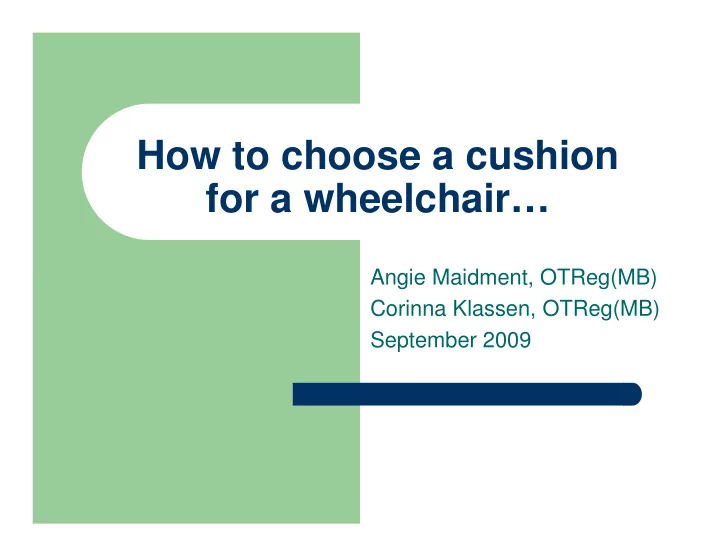

How to choose a cushion for a wheelchair… Angie Maidment, OTReg(MB) Angie Maidment, OTReg(MB) Corinna Klassen, OTReg(MB) September 2009
Goals of Seating � Promote function (provide support and control) � Promote comfort � Enhance appearance � Promote body symmetry and prevent deformity � Prevention of pressure sores � Enhance respiratory function � Promote sitting tolerance � Control spasticity � Decrease work of caregivers
How can you spot a problem with a seating system? � Poor sitting posture � Deformity, skin breakdown, impaired function, etc. � Seating or functional goals are not being met
Ideal Sitting Posture Pelvis Trunk � Slight anterior tilt � Symmetrical side to side � No obliquity or rotation � Sl. lumbar lordosis, sl. � Centred in seat Centred in seat thoracic kyphosis, sl. cervical lordosis Legs � Lumbar support � Well supported thighs � Neutral trunk rotation � Hips, knees and ankles near 90 Upper extremities � Neutral hip rotation and � Shoulder neutral abd/add protraction/retraction � Feet even on footrests � Supported hand arches
Ideal Sitting Posture Pelvis � Slight anterior tilt � No obliquity or rotation � Centred in seat
Considerations when choosing a cushion This client has a pressure sore… This client has a pressure sore… Dear OT, please help… “QUICK, get a ROHO!”
Maybe it is NOT the wheelchair’s fault!
Determine client needs… � Comfort � Positioning � Pain reduction � Pain reduction � Mobility � Mobility � Pressure � Function reduction � Temperature control
Determine client’s risk factors � Poor mobility � Poor hygiene � Decreased sensation � Malnutrition/ � Malnutrition/ � Decreased muscle Dehydration mass � Circulatory � Decreased strength problems � Incontinence � Other…
Considerations when choosing a cushion • Removable � Comfort � Cleanability • Ease of use � Weight � Cover options • Incontinence • Incontinence � Appearance � Appearance � Temperature control � Temperature control • Proof � Durability � Match with wheelchair • Pressure � Support/ � Maintenance needs • Reduction � Contour � Size • Cost � Stability • Adaptability
Types of cushions � Foam � Fluid � Fluid � Air � Combination � Honeycomb � Other
Properties of foam � Warm/hot � Most supportive � Can contour to body � May be difficult to � Different densities for Different densities for clean different regions � Breaks down/wears � Relatively inexpensive out relatively quickly � Lightweight � Least pressure � Can be cut to reducing individual’s shape � Fair shock absorption
Properties of fluid � Takes and holds � Less supportive than temperatures (hot foam and cold) and cold) � Easier to clean � Can leak because it has a � Relatively heavy closed surface � Relatively expensive � Fair pressure reduction properties
Properties of air � Most pressure � Least supportive reducing � Requires a lot of � Requires a lot of � Easier to clean maintenance and because it has a frequent pressure closed surface. checks Waterproof. � Relatively � Absorb impact expensive
Properties of honeycomb cushions � Fair pressure � Strange sensation reduction on buttocks � Relatively easy to � Can wear out in clean 2-3 years � Lightweight � Good support
Properties of combination cushions � May provide some support and some pressure reduction � Features vary according to cushion style
Assess… Don’t Guess http://www.academic-answers.com/process.htm
Assessment Techniques � Interview – Self care – Productivity – Leisure – Roles – Environment � In chair assessment � Mat assessment – Sitting – supported and unsupported – Lying Simulation or assessment in trial system �
Funding � Manitoba Health – SMD – Wheelchairs only – individual purchases own seating � Third Party (eg. MPI and WCB) – vendors � EIA – SMD – prefers Materials Distribution Agency for seating � Medical Services – SMD – vendors with justification
Call Therapy First with more questions (p) 204-612-0398 (p) 204-612-0398
Recommend
More recommend